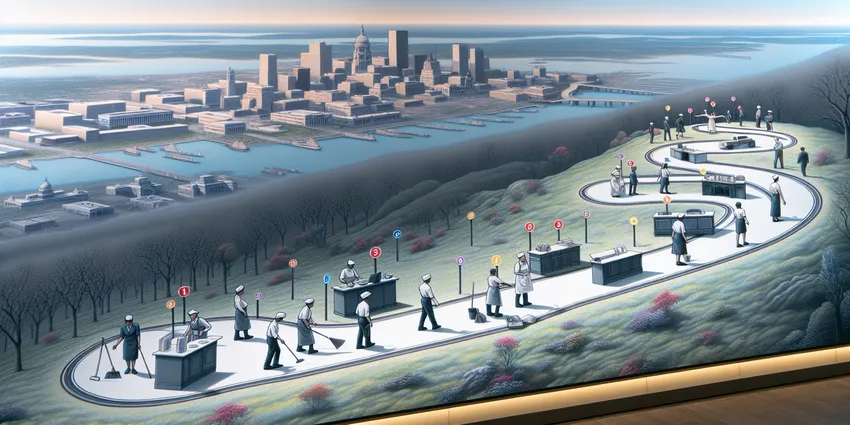Busser Career Progression Roadmap: Key Takeaways
- The busser position is an entry-level role providing essential restaurant experience.
- Advancement typically moves from busser to senior busser, then server roles, followed by leadership and management positions.
- Senior and management roles require leadership skills, operational knowledge, and sometimes additional education.
Starting as a busser opens a clear pathway in the restaurant industry. This article maps the career progression from entry-level bussing roles up to senior management positions.
Understanding each step’s responsibilities and required skills helps bussers plan their growth within hospitality.
For business owners looking to optimize restaurant staffing, effective restaurant staff hiring strategies can be essential for building a strong team.
1. Entry-Level Busser Role and Responsibilities
The busser, often called a busboy or busgirl, is a critical team member supporting restaurant operations. Key tasks include clearing and resetting tables, refilling water glasses, restocking condiments, and maintaining dining area cleanliness.
This position demands being detail-oriented, efficient, and able to thrive in a fast-paced environment while working closely with servers and kitchen staff.
To better understand the busser job description and responsibilities, employers can refer to comprehensive guides on OysterLink.
For newcomers, the busser role provides valuable exposure to customer service fundamentals, teamwork, and basic restaurant workflow.
2. Advancing to Senior Busser
After gaining about 1-3 years of experience, bussers can move into senior busser positions. This step involves performing standard duties with higher speed and autonomy while supporting several dining sections at once.
Senior bussers also take on training responsibilities, helping new staff learn restaurant protocols and service quality standards.
Developing a proactive mindset to anticipate servers’ and guests’ needs is vital for success in this role.
Learn more about strategies for server and staff training which are crucial for senior bussers who mentor new team members.
3. Transitioning from Busser to Server
Many bussers aspire to become servers, a role with direct guest interaction through order taking and food delivery. The busser experience builds a strong service foundation by teaching flow and teamwork critical to serving effectively.
To progress to server positions, bussers must demonstrate reliability, strong work ethic, and excellent interpersonal skills.
This transition marks a shift to more customer-facing duties and the opportunity to earn higher wages through tips.
Employers can find valuable tips on how to hire servers and waiters to build a competent front-of-house team.
4. Steps to Lead Server or Head Waiter Roles
With solid experience as a server, individuals can advance to lead server or head waiter positions. These roles involve supervising junior staff and managing parts of the dining room to maintain service standards.
Crucial skills include leadership, effective decision-making, and deep operational knowledge.
Lead servers coordinate smoothly with kitchen staff and management to optimize guest satisfaction.
To assist restaurant owners in selecting leaders, the managing servers in a restaurant spotlight offers actionable advice for overseeing and developing dining staff.
5. Advancing to Management in the Restaurant Industry
Management roles like restaurant manager or food and beverage manager require further experience, leadership capabilities, and sometimes formal education.
Managers oversee daily restaurant operations, staff scheduling, budgeting, and guest satisfaction metrics.
Strong organizational skills and business acumen become essential for handling these responsibilities successfully.
For tips on recruiting qualified leaders, explore the how to hire a restaurant manager guide to enhance your recruitment process.
6. Senior-Level Career Opportunities for Bussers
At the senior level, career options include regional restaurant manager, director of food and beverage operations, or even owning a restaurant.
These roles focus on strategic planning, supervising multiple locations, and making critical business decisions.
Reaching this stage requires extensive industry experience, exceptional leadership, and a comprehensive understanding of hospitality management.
Restaurant owners looking to make informed hiring decisions can benefit from a guide to hiring a restaurant consultant to assist with strategic growth and management improvements.
7. Career Progression Best Practices for Bussers
To advance effectively, bussers should focus on developing strong communication, teamwork, and customer service skills early on.
Seeking feedback, pursuing cross-training opportunities, and demonstrating leadership qualities even in entry-level roles can accelerate progression.
Engaging with training programs or hospitality courses can further prepare individuals for supervisory and management roles.
Employers may also find value in articles about how to hire high performers to build a motivated team.
8. Useful Resources for Busser Career Development
- Explore career information from the U.S. Department of Labor – Wage and Hour Division for labor standards.
- Review the U.S. Department of Labor Occupational Outlook Handbook for details about food and beverage serving jobs.
For bussers considering career advancement, consulting the detailed how to become a server resource can provide useful next steps.
Busser Career Progression Roadmap: Conclusion
Starting as a busser offers a foundational opportunity to enter the restaurant industry and build valuable experience.
Through acquiring skills, gaining experience, and showing leadership potential, individuals can progress into senior serving roles and eventually management.
This clear career path rewards dedication and continuous development, supporting long-term success in hospitality.
Restaurants aiming to improve retention and career development may find insights in the strategies to reduce restaurant employee turnover highly beneficial.










Loading comments...